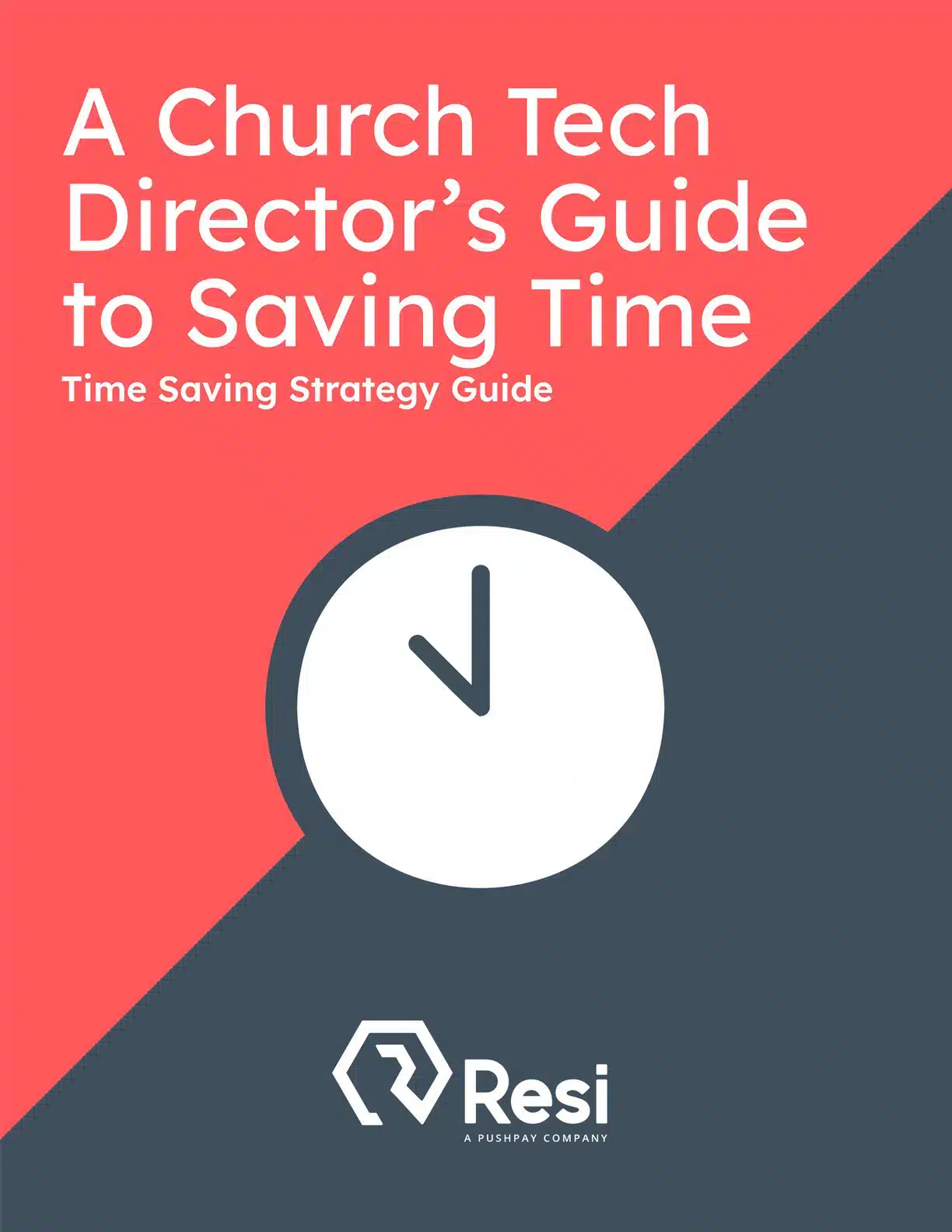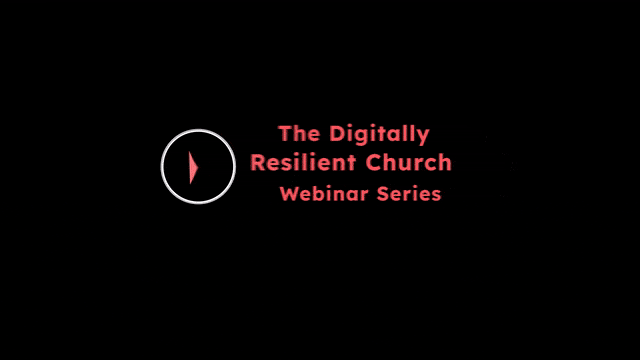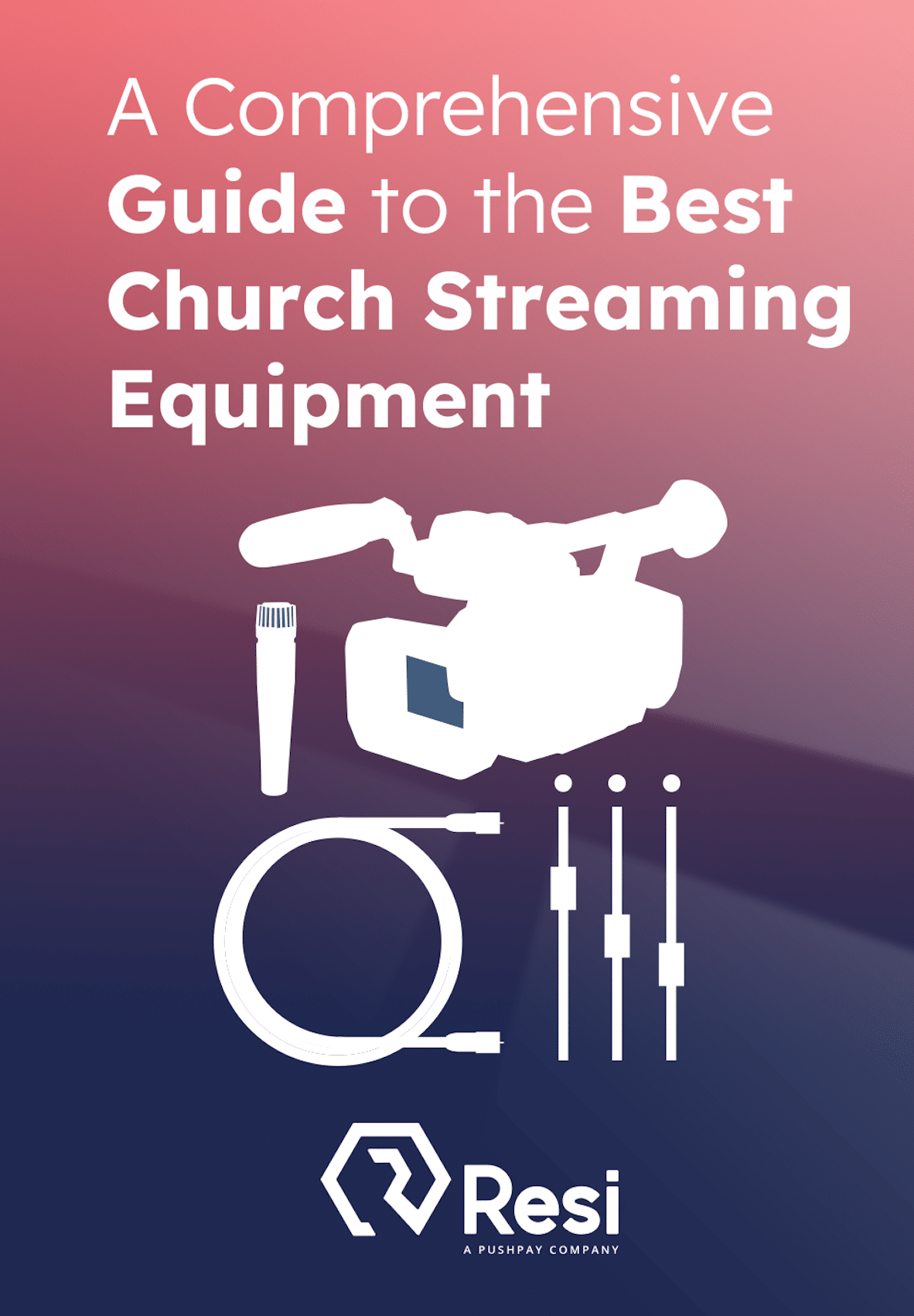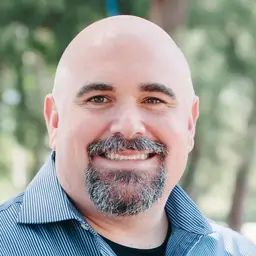
You’re a church techie. You love your church and its vision and direction. You’re passionate about the one hour on Sunday and want to maximize the 167 hours in between to make sure each Sunday experience is done with excellence. You are the definition of FILO (first in, last out), and you wear that badge with honor. Unfortunately, you’re often misunderstood. You believe you’re under-resourced and lack deep relationships with your peers. You find yourself questioning the motivation and urgency of others you work with. As a result, you feel alone.
I hear you. I understand. I’ve been there.
Holy Week 2011 broke me. As I look back on my ministry career, there are many high points, and if I’m honest there are some low points. Easter 2011 was the culmination of many of those low points.
As Production Director overseeing live production across a multisite megachurch, there was a lot of pressure heading into each Sunday. In 2011, this was amplified across the five multisite campuses and the fact the church I was at had no other production staff support. I, alone, carried responsibility across the campuses for production. Adults, Kids, Students… All of this responsibility culminated during Holy Week 2011 with me working 106 hours. I couldn’t even speculate about the thousands of volunteer hours clocked that week.
If I’m honest, I still carry emotional scars from that week. New rigging points for lighting at the broadcast campus. New stage designs across all campuses. We also installed a new image/video network at one of our setup/teardown campuses so they could broadcast between multiple theaters. We worked early mornings in theaters before they opened. We worked late nights at the other campuses when volunteers were available, prepping new stages for new looks. Oh, and it was a compressed week as our Easter Services started not on Good Friday but on Thursday! By the end of the week, I was spent. Exhausted. And alone.
Can you relate? I started looking for my next church job the Monday after that Easter, and my family moved to another state within three months.
Understand the Role and Its Challenges
In hindsight, leadership didn’t understand what they were asking of me. They didn’t realize the expectations for perfection were too high. They didn’t appreciate our level of buy-in with volunteers or the weight I was carrying across other departments.
In the years since, I’ve buried the hatchet, so to speak, but I hold a degree of blame for how I was led in that season. However, I must acknowledge that I should own some of the blame myself.
Unfortunately, 106 hours in one work week wasn’t that abnormal for me during that season. It was common for me to work in the 80s-90s. Assuming nothing went wrong, and every department delivered the pre-production assets on time, and the volunteers produced their work, I still clocked 70 hours a week in the office. I’m not counting working from home. Truthfully, I thrived in that environment. I’m a “Type-A” personality with a high level of “achiever” mixed in. Every week was a challenge to overcome.
Meanwhile, my life struggled outside of the workplace, including at home. I was essentially an absentee father with two kids under three at home. My relationship with my wife was also absent. When I was home, I was working, emailing, and texting. Mental health carried a lot more stigma in 2011 than it does today, so seeking outside help felt taboo. And, unfortunately, organizations didn’t have to pay overtime back then like they do now. I could have banked all those overtime hours!
Taking Back Monday: A Church Tech Director’s Guide to Saving Time
With this resource, you can take back time on Mondays and focus on what matters most—serving your ministry.
Download for free!
Why do I blame myself? Every week, almost every day, I convinced myself of a simple lie: “It’s only for a season.” Maybe that lie was grounded in truth at some point. Our church grew exponentially overnight, going from one to five campuses in less than 18 months. Innovation was constantly expected, but my budget was basically a ball of twine and a pack of gum.
Rather than building out staffing structures or financially investing in better technology, I was holding together production for kids, students, and adults across five campuses, utilizing hundreds of volunteers while stretching technology beyond its capacity. And rather than respecting myself enough to say “No,” the achiever in me said yes… essentially painting me in a corner of unhealthy expectations.
Fear of gossip or talking against the church I was working at kept me from talking to others I worked with, so I had limited support from co-workers. I was working too many hours to have a life outside of work, so I didn’t even have relationships with other production people at other churches. I was alone.
Do you have a story like mine? “Unreasonable” expectations? Leadership that doesn’t understand? Lack of a support system? It’s so easy to play the victim, which I did for years. But as I said, I’m as guilty as those who led me. In hindsight, let me tell you some things I’d do differently today if I found myself in the same situation
Build a Supportive Network
In the years since I left that church and told my story, I’ve met hundreds of tech people across multiple states (even countries) who share a similar story. So, you’re not alone by any stretch… which begs the question: How do you find these people?
For your sanity, build relationships. The easiest way to do this is by meeting the tech people at churches near you.
Despite how some churches operate, we’re not in competition with our neighboring churches. Check out neighboring church websites to find out who the staff (or volunteer) tech person is. Take them to lunch or coffee, or start with a simple Zoom or Google Meet call. Just learn about them and their story.
Some of my most significant relationships post-2011 have been from talking with people at the “other” churches. If nothing else, it’s a chance for you to empathize with another person, hopefully allowing you to mentor them while they mentor you. I’ve had friends start up regional networks of church production people just simply calling around to churches in the area and inviting their tech people to a meetup. There’s no reason why this wouldn’t work!
There are also opportunities for you to network with others that might be more technically proficient and experienced than you. National networks like MxU and Church IT Network are moving towards more regional events. Regional networks like these are a great way to find your “tribe,” get technical training, and emotional release as you’re alongside brothers and sisters who “get you.”
Establish a Mentor-Mentee Relationship
One of the best things I’ve done in subsequent church jobs was build better relationships with other pastors and staff.
“Achiever” Jeff was overwhelmed by his job in 2011 and didn’t take time to meet people or build relationships. Instead of being obsessed with my job, I’ve learned to get to know the people I’ve been working with. Some of the best mentor relationships I’ve ever had were with an Executive Pastor who took the time to listen to me (even though I didn’t directly report to him) or a Campus Pastor who liked to grab coffee with me and dream about what church can be. One of my most incredible ministry supporters was a global missions pastor at a church I once worked with. Sometimes, you’ll find support where you least expect it.
Another mentor relationship I had was with a pastor at a church in another city 90 minutes away from mine. It’s a larger church, the size of the church we hoped to become. I was Communications Director at this point, but I built a relationship with this individual over social media, engaging and commenting on his posts and links.
The relationship became strong enough that, eventually, I asked him if I could come down to his church and just “hang out with him for the day.” I watched what he did and how he did it. I observed his processes and took away learnings.
This person had no reason to mentor me. There was no benefit to him, and he was busy (just like me). However, his mentorship during the several trips I took to his church and conversations post-trips via text were hugely impactful in my life, especially in how I interacted with my leadership.
Leverage Technology to Stay Connected
Almost 15 years after my 2011 horror story, I’m now one of these guys who helps churches do what they do.
The Church Digital has helped thousands of churches with their digital ministry, and alongside Resi, I’m looking forward to helping even more. I say that not egotistically, but I can give you names of production guys like me who are easily approachable via social media.
While you may not get a chance to sit down for coffee with the people you follow on social media, you can engage in conversation with them—ask questions, and, likely, get responses.
Sometimes, you need to take the first step and share their posts or turn on notifications and try to be the first person to like what they’re saying. It seems foolish, but this goes a long way in getting your handle recognized by people with large followings. I’ve been continually surprised by how much time influential people will give online to people who have questions.
Conclusion
It’s easy to feel alone. But there’s no reason to.
In today’s tech-savvy world, digital communities thrive. Organizations are striving to become more accessible via regional approaches. Tech influencers want to engage and help their followers. Even non-technological engagement—like buying a cup of coffee for a neighboring techie—can go a long way in overcoming isolation.
The last challenge, as you’re being mentored, is: Who are you mentoring? Who in your life are you pouring into? Is there someone online? Or in a digital community? How would you handle someone who reached out to you for help? Find the Pauls in your life, people who will mentor you. But take the time for your Timothy—the people you need to mentor— as well.
My teenage daughter ironically asked me recently that if I could go back in time to any church I’ve ever worked for and relive that season, which church would I go back to and why? Without hesitation, I’d return to the years that culminated in Easter 2011 and manage myself better and healthier.
I’d understand that I alone control my ability to be no longer alone, and I’d strive to live my life better, Lord-willing, during that season.







